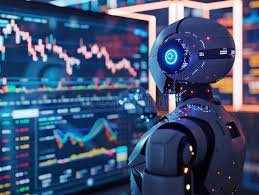Introduction
Stock market crashes have historically led to financial turmoil, affecting economies, investors, and businesses worldwide. Predicting next stock market crash has always been challenging due to the complexity of financial markets. However, with advancements in Artificial Intelligence (AI) and Machine Learning (ML), financial analysts now have more powerful tools to detect early warning signs.
In this blog, we explore the top AI tools that help predict stock market crashes, real-life case studies, and how AI-driven models have successfully flagged risks before major downturns.
How AI Predicts Stock Market Crashes
AI leverages large datasets, including:






Top AI Tools for Predicting Stock Market Crashes
1. IBM Watson
IBM Watson uses Natural Language Processing (NLP) and deep learning to analyze news articles, social media, and economic data to detect potential stock market risks.


2. Bloomberg Terminal AI
Bloomberg’s AI-driven analytics provide predictive insights using vast financial datasets and sentiment analysis. The tool detects abnormal market patterns and price movements.

3. Kavout AI
Kavout is an AI-powered investment tool that evaluates market trends using deep learning and predictive modeling. It ranks stocks based on their probability of a downturn.

4. AlphaSense
AlphaSense is a financial AI tool that scans earnings calls, SEC filings, and macroeconomic reports to detect risk signals.

5. Sentiment Analysis with RavenPack
RavenPack tracks news and social media sentiment to assess market risk levels. It helps traders gauge fear and optimism in financial markets.

Case Studies: How AI Predicted Stock Market Crashes
1. AI and the 2008 Financial Crisis (Retrospective Analysis)
Before the 2008 housing crash, AI models could have flagged red flags such as:


Although AI wasn’t as advanced at the time, modern models analyzing past data now recognize these patterns as warning signs.
2. AI’s Early Warnings Before the 2020 COVID-19 Crash
In late 2019, AI tools like IBM Watson and Bloomberg AI identified a surge in pandemic-related concerns in China before mainstream media picked it up.

- Analyzed travel and supply chain disruptions
- Detected panic in financial news sentiment
- Identified early stock sell-offs in Asia before global markets reacted
3. Predicting the 2022 Market Correction
AI-powered platforms like RavenPack and Kavout detected inflation fears, rate hikes, and geopolitical risks in early 2022. Many hedge funds using AI-based models adjusted portfolios before major stock declines.
Limitations of AI in Next Stock Market CRASH Predictions



Conclusion: Should You Rely on AI for Stock Market Predictions?
AI tools enhance market forecasting but should be used alongside traditional analysis. Investors can benefit from AI insights, but relying entirely on AI is risky due to unpredictable economic and political factors.



